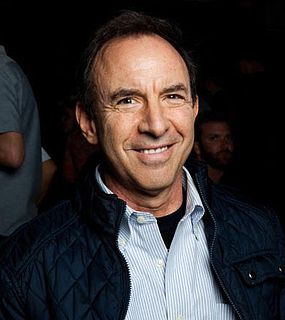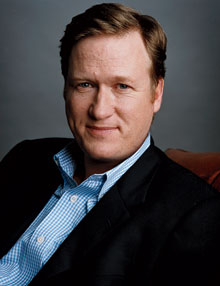Related Research Articles

Robert L. Heilbroner was an American economist and historian of economic thought. The author of some 20 books, Heilbroner was best known for The Worldly Philosophers: The Lives, Times and Ideas of the Great Economic Thinkers (1953), a survey of the lives and contributions of famous economists, notably Adam Smith, Karl Marx, and John Maynard Keynes.

Andrew Tobias is an American writer. He has written extensively about investment, as well as politics, insurance, and other topics. He is also known for writing The Best Little Boy in the World, a 1973 memoir – originally pseudonymous – about life as a gay man. From 1999 until 2017 he was treasurer of the Democratic National Committee.
Nicholas Confessore is a political correspondent on the National Desk of The New York Times.
James Bennett Stewart is an American lawyer, journalist, and author.

The Gerald Loeb Award, also referred to as the Gerald Loeb Award for Distinguished Business and Financial Journalism, is a recognition of excellence in journalism, especially in the fields of business, finance and the economy. The award was established in 1957 by Gerald Loeb, a founding partner of E.F. Hutton & Co. Loeb's intention in creating the award was to encourage reporters to inform and protect private investors as well as the general public in the areas of business, finance and the economy.
Paul Joseph Ingrassia was an American Pulitzer Prize-winning journalist who served as managing editor of Reuters from 2011 to 2016. He was also an editor at the Revs Institute, an automotive history and research center in Naples, Florida, and the (co-)author of three books. He was awarded the Gerald Loeb Lifetime Achievement Award for financial journalism.
Paul Steiger was managing editor of The Wall Street Journal from 1991 until May 15, 2007. After that, he was the founding editor-in-chief, CEO and president of ProPublica from 2008 through 2012.
Joseph B. White is a Pulitzer Prize-winning journalist known for his work for The Wall Street Journal.
Daniel Hertzberg, an American journalist, is the former senior deputy managing editor and later deputy managing editor for international news at The Wall Street Journal. Starting in July 2009, Hertzberg served as senior editor-at-large and then as executive editor for finance at Bloomberg News in New York, before retiring in February 2014. Hertzberg is a 1968 graduate of the University of Chicago.
Michael A. Hiltzik is an American columnist and reporter who has written extensively for the Los Angeles Times. In 1999, he won a beat reporting Pulitzer Prize for co-writing a series of articles about corruption in the music industry with Chuck Philips. He won two Gerald Loeb Awards for Distinguished Business and Financial Journalism.

Bryan Burrough is an American author and correspondent for Vanity Fair. He has written six books. Burrough was a reporter for The Wall Street Journal in Dallas, Texas, between 1983 and 1992. He has written for Vanity Fair since 1992. While a Wall Street Journal reporter, he won the Gerard Loeb Award for excellence in financial journalism three times. Burrough has written a number of book reviews and OpEd articles for publications such as The New York Times, Los Angeles Times, and The Washington Post. He has also made appearances on "Today", "Good Morning America", and many documentaries.
Alix M. Freedman is a Pulitzer Prize-winning American journalist, and ethics editor at Thomson Reuters.
Albert Lawrence Delugach was an American Pulitzer Prize-winning reporter. He began his career with The Kansas City Star in 1951. He retired from his last newspaper, the Los Angeles Times, in 1989. In 1969, he shared the Pulitzer Prize for Investigative Reporting with fellow reporter Denny Walsh of the St. Louis Globe-Democrat for their campaign exposing corruption within a St. Louis labor union. In 1984, he shared the Gerald Loeb Award for Spot News for their coverage of the death of gold trader Alan D. Saxon.
Susanne Craig is a Pulitzer Prize-winning investigative journalist, currently working at the New York Times. She was the reporter who was anonymously mailed Donald Trump's 1995 tax returns during the 2016 presidential election. In 2018 she was an author of The New York Times investigation into Donald Trump’s wealth that found the president inherited hundreds of millions of dollars from his father, some through fraudulent tax schemes. She is also known for her coverage of the financial crisis of 2007–2008 and of New York State and New York City government and politics.
Ianthe Jeanne Dugan is an American journalist. She is an investigative reporter for The Wall Street Journal. She earned the Gerald Loeb Award in 2000 for Deadline and/or Beat Writing for her article "The Rise of Day Trading", and again in 2004 for Deadline Writing with Susanne Craig and Theo Francis for their story "The Day Grasso Quit as NYSE Chief". She was a Pulitzer Prize finalist with a team for international reporting in 2017 for coverage of Turkey. In 2018, she won a Society of American Business Editors and Writers award for coverage of self-driving cars. She was the Wall Street reporter for The Washington Post and worked at Newsday and Business Week. She was lead researcher for the movie American Made.
The Gerald Loeb Award is given annually for multiple categories of business reporting. The category "Deadline and/or Beat Writing" was awarded in 1985–2000, "Beat Writing" in 2001, and "Deadline or Beat Writing" in 2002. Beginning in 2003, it was split into "Deadline Writing" (2003–2007) and "Beat Writing" (2003–2010). "Beat Writing" was replaced by "Beat Reporting" beginning in 2011.
The Gerald Loeb Award is given annually for multiple categories of business reporting. The category "Editorials" was awarded in 1970–1972, "Columns/Editorial" in 1974–1976, "Columns" in 1977, "Columns/Editorial" again in 1978–1982, "Editorial/Commentary" in 1983–1984, and "Commentary" in 1985 onwards.
The Gerald Loeb Award is given annually for multiple categories of business reporting. The "Newspaper" category was awarded in 1958–1973. It was split into two categories beginning in 1974: "Small Newspapers" and "Large Newspapers". A thirdh category, "Medium Newspapers", was created in 1987. The small and medium newspaper awards were combined together as "Medium & Small Newspapers" in 2009–2012, and "Small & Medium Newspapers" in 2013–2014. The last year newspaper categories were awarded was 2014.
The Gerald Loeb Award is given annually for multiple categories of business reporting. Lifetime Achievement awards are given annually "to honor a journalist whose career has exemplified the consistent and superior insight and professional skills necessary to contribute to the public's understanding of business, finance and economic issues." Recipients are given a hand-cut crystal Waterford globe "symbolic of the qualities honored by the Loeb Awards program: integrity, illumination, originality, clarity and coherence." The first Lifetime Achievement Award was given in 1992.
The Gerald Loeb Award is given annually for multiple categories of business reporting. The "Magazine" category is one of the two original categories awarded in 1958, with the last award given in 2014. The category included articles published the prior year in national and regional periodicals until 2008, when it was expanded to include magazine supplements to newspapers. Previously, newspaper magazine supplements were entered into an appropriate newspaper category. The "Magazine" and "Large Newspaper" categories were replaced by the "Feature" category in 2015.
References
- 1 2 3 "Times writers Delugach, Soble get Loeb Award". Los Angeles Times . CIII (122). April 3, 1984. p. 2 Part IV. Retrieved February 15, 2019– via Newspapers.com.
- 1 2 "Articles by a Post Reporter Win '84 Gerald Loeb Award". The Wall Street Journal . 107 (128). April 11, 1984. p. F5. ISSN 0190-8286.
- ↑ "Loeb citation for Times". The New York Times . June 29, 1983. p. D17. Retrieved February 7, 2019.
- ↑ Delugach, Al (September 30, 1983). "Precious metals firm's chief found dead". Los Angeles Times . CII (301). p. 2 Part IV. Retrieved February 25, 2019.